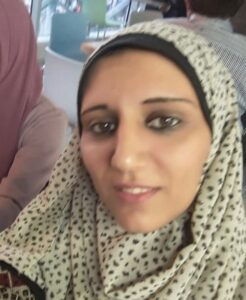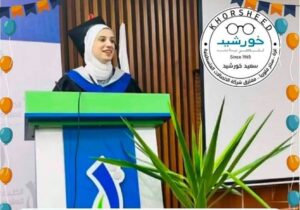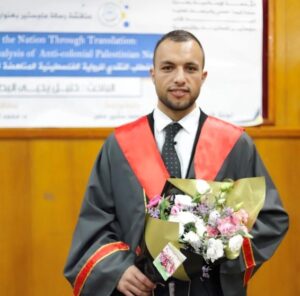This blog article was written by Ayman Qwaider (EENET’s Arabic/MENA Network Manager), 07 November 2023.
A French translation and an Arabic translation is also available.
Children as targets
Half of Gaza’s two-million population are children, and right now one of them is being killed every 10 minutes. Since 7 October 2023,[1] Gaza Ministry of Health statistics show that at least 4,100 Palestinian children have been killed in the Israeli army’s relentless bombardment. More than 1,000 more children are missing, likely buried under destroyed buildings.
Targeting civilians, especially children, constitutes a serious violation of the Geneva Conventions and is considered a war crime. Children should never be targeted in any conflict by any party. Children in Gaza are the most affected by the ongoing Israeli aggression, which has deprived them of their basic rights, including access to food, water, shelter, education, healthcare, and safety.
A caged childhood
No child in Gaza today has ever known freedom. Since 2005, Gaza has experienced severe restrictions imposed by Israel, and the blockade strengthened when Hamas came to power in 2006. The UN considers Israel to be an ‘occupying power’ within Palestinian territories and the blockade violates international law. Gaza is one of the most densely populated areas on earth (5,850 per square kilometre), often described as akin to the largest open-air prison in the world.
For 16 years Gaza’s economy, infrastructure, employment, communications, education, and health systems have been strangled and the movement of its people almost entirely restricted. Most children have not experienced a full 24 hours of uninterrupted electricity supply in their lives. While the recent extremely life-threatening humanitarian catastrophe has attracted global attention, UN and humanitarian agencies have been speaking about the growing humanitarian crisis in the Gaza Strip for many years and warning of the gross violations of multiple human rights. |
Education disrupted
Gazans are vibrant, educated people with dreams of a better future. The aspirations of generations are under attack now more than ever before. More than 625,000 students and 22,564 teachers in the Gaza Strip have been affected by the assault on education for the last month. Children have no access to education and no safe place to hide. The Ministry of Education in Gaza has cancelled the entire academic year, and 214 schools have so far been damaged due to shelling, with 45 schools entirely out of service. Teachers have been killed in the bombardment.
Alaa Qwaider, a loving mother, was killed in her own home during an Israeli airstrike that destroyed her house. This devastating attack also claimed the lives of her three young children: Eman, tragically killed on her fifth birthday, Faiz, aged four, and little Sarah, only seven months old. Fourteen other family members were killed in the same airstrike, leaving only Alaa’s husband alive.
 Alaa was not only a mother but a highly respected maths teacher at a high school in Gaza City. She took great pride in her career and the important mission of educating young minds. She often shared photos of her accomplishments with me. Her dedication to teaching was evident in her interactions with her students who held her in high regard for her commitment to their education. Alaa recognised the context of her students’ lives – living under blockade for 16 years within an apartheid regime,[2] and witnessing regular military operations – and how this impacted their learning and emotional needs. She actively sought training and skills development opportunities to better support her students, especially those who had been exposed to trauma.
|
The Palestinian Ministry of Higher Education reports that 437 higher education students and 12 academic staff were killed in the first three weeks of this latest war, 85% of whom were in Gaza. Many more students are feared buried under the rubble. The education of nearly 90,000 higher education students is disrupted as universities have been forced to suspend all operations. One university in Gaza has had to cancel its 2023-24 academic year due to the loss of all its students in Israeli bombings.
Gaza Children’s Cinema and trauma-responsive education
Until 7 October, the Gaza Children’s Cinema (GCC) project operated within local community libraries across the Gaza Strip with the support of the initiative’s partner, the Tamer Institute for Community Education.
GCC had focused its activities in marginalized and border communities, where it reached out to children who were often hardest to access. Unfortunately, these border communities have been particularly vulnerable to destruction by Israeli forces, especially during ground incursions. Reports indicate that across the Gaza Strip, over 200,000 housing units have been either destroyed or damaged and dozens of public and service facilities – such as those used by GCC – have suffered significant damage.
GCC was purposefully created to offer alternative educational experiences and recreational activities for children deeply affected by trauma. It provided them with temporary respite from the challenging reality they faced. Before the latest aggression in Gaza, nearly one-in-three children in Gaza already received support from trauma response programmes. The current devastating bombardment on an unprecedented scale has exposed the children in Gaza to even more severe and long-lasting trauma, with consequences that will likely persist throughout their lives. But vital programmes to support them, like GCC, have been wiped out and may take many years to rebuild.
UNICEF has stated that in the last few weeks “Gaza has become a graveyard for thousands of children”. It’s impossible to comprehend the impact of this on Gaza’s surviving children. Trauma response education programmes will need to be an essential component of mainstream education in emergency interventions for the foreseeable future. This means scaling up relevant training for teachers and educators, and equipping them with the skills to support their students effectively. But teachers and educators, themselves traumatised, will require much more emotional and professional support to ensure they can provide the necessary assistance to their traumatised learners. However, none of this can happen until there is a complete ceasefire between the Israeli forces and Hamas.
Protecting children’s rights
The international community is taking note of this war. Adele Khodr, UNICEF Regional Director for the Middle East and North Africa, has called it a “growing stain on our collective conscience”. UNICEF, along with hundreds of NGOs, has also called for an immediate ceasefire to protect the children in Gaza.
It is crucial for the international community to take immediate action to protect the rights and well-being of Gaza’s children, provide humanitarian aid, and work towards a sustainable ceasefire. The world must stand together to ensure that safety, healthcare and education are not luxuries but fundamental rights for all.
Gaza’s lost learners and teachers
Many thousands of innocent children, their families and teachers have been killed in Gaza, not just in recent weeks, but over the course of the last 75 years.
Osama Abu Safia[3] was a medical student at Al Azhar University in Gaza. He had recently passed the USMLE[4] Step 1 exam and was an active volunteer, promoting health education in mosques and schools. His potential to become a talented medic in the future and his contributions to his community were tragically cut short by an Israeli airstrike on Gaza.
Yasmine Khorshid[5] graduated just three months ago after specialising in library management. Yasmine was killed with her family, aunts, uncles and their children in Gaza City. More than 30 people from the Khorshid family were killed.
Khalil Abu Yahiya[6] was killed along with his entire family in Gaza. Khalil was a lecturer at the Islamic University of Gaza and was widely recognised for his brilliance as a writer, activist, and thinker.
|
Footnotes
[1] On 7 October 2023 Hamas killed 1400 Israelis and took more than 200 hostages, including children.
[2] See: https://www.hrw.org/report/2021/04/27/threshold-crossed/israeli-authorities-and-crimes-apartheid-and-persecution and https://www.amnesty.org/en/latest/campaigns/2022/02/israels-system-of-apartheid/
[3] https://twitter.com/osaidessermd/status/1719118526168899961?s=46&t=PTHQCFBhd570mEv_M8fiQw
[4] United States Medical Licensing Examination
[5] https://twitter.com/uzisall/status/1719699570010046958?s=46&t=PTHQCFBhd570mEv_M8fiQw
[6] https://twitter.com/fatimazsaid/status/1719165606375641174?s=46&t=PTHQCFBhd570mEv_M8fiQw




